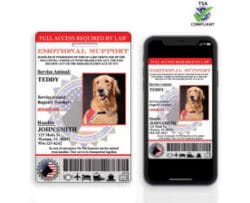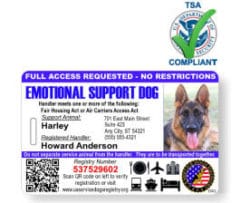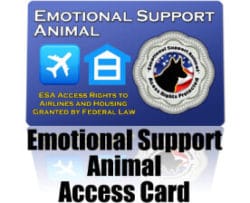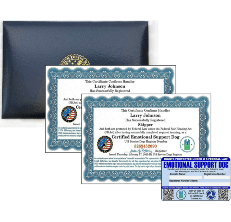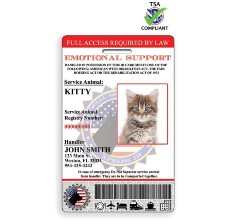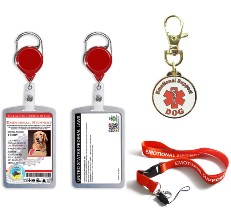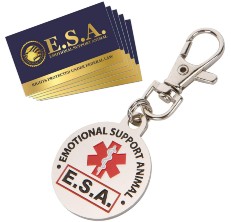- Home
- Gear Categories

Last updated: 31 May 2024
We independently research, test, review, and recommend the best products - learn more about our process here. If you buy something through our links, we may earn a commission.
Best Emotional Support Animal ID Cards To Identify Your Dog With
Published 24 Nov 2020
Show contents
Best Emotional Support Animal ID Card
- 1 XpressID Holographic Emotional Support Animal ID Card
- 2 Just 4 Paws Custom Holographic QR Code Emotional Support Animal ID Card
- 3 Emotional Support Animal ID Card
- 4 Service Dog Cards Emotional Support Animal ID Card
- 5 Just 4 Paws Store Dog Info ID Card
- 6 Xpress ID Store Animal Feline/Cat ID
- 7 Xpress ID Store Emotional Support Animal ID
- 8 WORKINGSERVICEDOG.COM Dogs Information Cards
It’s important to note that an emotional support animal does not qualify as a regular pet and that it differs from a service animal. In principle, a certified ESA (Emotional Support Animal) provides comfort to help relieve a symptom or ease the effects of a person’s disability. Typically, the animal is either a dog or cat and it provides a therapeutic benefit and companionship relief to its handler. If your dog qualifies as an emotional support animal, you can get an ID card for it to make it stand out from usual pets. Through this article, we’ll be putting forward a list of the providers for the Best Emotional Support Dog ID Cards in 2024. Also, at the end of this article, you’ll find a detailed guide that’ll answer all your questions around the topic. Usually, to qualify for an emotional support animal, its owner must have some sort of emotional or mental disability that’s certified by a medical health professional.
Best Emotional Support Animal ID Card
1
XpressID Holographic Emotional Support Animal ID Card
– Best OverallTHE SCOOP
The ID card is printed using the latest thermal transfer printing technology. The cards are made from PVC Composite Plastic, making them sturdy. With each purchase, the animal is registered to the U.S. Service Animal Registry and a unique QR code is printed on the rear side of the card. It redirects to the handler and dog’s profile page on the registry site once scanned.
Key Features
The card comes with a Holographic Overlay which protects the card from wear and tear. However, there may be printing errors in a few cards.
THE SCOOP
This ID card is made of thick PVC plastic, with High Definition printing. It includes the dog’s picture, names and its owner’s names with address and contact number. The holographic seal is embedded and the card does not use any lamination. Moreover, the ID cards are the same size as a credit card, so you can easily carry them in your wallet or attach them with the provided strap to your dog’s harness or collar.
Key Features
While these cards are great to have on you, there may be printing issues with a few of them.
3
Emotional Support Animal ID Card
– High DefinitionTHE SCOOP
This ID card is made of thick PVC plastic which makes it unbendable and highly durable. It uses thermal transfer printing technology.You can easily carry the card in your wallet, or tag it with your dog’s vest, as it helps people identify that it’s your dog. It ensures that your support you at all times.
Key Features
The card has high definition printing and has sharp images and text. However, some airlines may not accept this card and you will have to make alternate arrangements.
4
Service Dog Cards Emotional Support Animal ID Card
– Most DurableTHE SCOOP
This service dog ID card is made in the USA and is used to help distinguish your dog from the rest. It’s specially authorized by the American with Disabilities Act (ADA). It gives you the legal right to own a support animal that can accompany you places where pets are generally not allowed.
Key Features
This service dog card is smaller than a credit card and is easy to carry or tag with the dog vest. However, it has smaller printing which can be difficult to read at times.
THE SCOOP
Available in a wide variety of colors, these folders can be used to represent a dog’s owner and any members of his or her immediate family.
Key Features
This certificate is printed on premium quality bond with a watermarked & micro-printed border on a 25% cotton half size certificate. This card also includes an embossed full color gold seal. The certificate holder is a padded leather navy blue folder with ussdr gold-stamped logo to carry and protect your paperwork. Also included is a pvc plastic credit card size handler/dog presentation card that you may fill out with your dog’s information.
THE SCOOP
This is an easy to use id tag for your animal. It is both functional and stylish, and all you need to do is scan it to your device to upload your personalized photo and information about your ESA.
Key Features
This ID card is made from PVC composite plastic and has a 600 dpi print quality. It can be used to register your service animal with the U.S. Service Animal Registry, which allows for an ESA dog to travel with its owner on an airplane. The back side of the card contains a unique QR code that redirects to the handler and dogs profile age on our registry site. A holographic overlay protects this card from scratches, tear and wear.
THE SCOOP
This is a unique holographic ID card that can be easily scanned to register your pet. It can be customized to fit your dog’s photo and name.
Key Features
This ID card is made from PVC composite plastic. It has a holographic overlay that protects it from scratches, tear and wear. A unique QR code is printed on the rear side of the card, when scanned it will redirect to the handler and dogs profile age on our registry site. The registration process is done simultaneously as you enter your dog and handler information. You’ll also be able to get an air carrier access act (acaa), which allows for an emotional support animal to travel with its owner in an airplane.
THE SCOOP
This is an official ESA card that includes a color-coded list of ESA protocols by race, breed, and size.
Key Features
This dog tag is a great way to keep track of your pet’s medical history, allergies, and more. It can be attached to the dog’s collar, harness, carrier or vest. The tags are made from durable materials that won’t fade over time. However, they may not last the extent of the animal’s life depending on external wear & tear.
Best Emotional Support Animal ID Cards Buying Guide
An emotional support dog is a dog trained to help a person in a variety of ways, such as provide comfort, guide a blind person, alert a seizure victim, or calm a fearful dog. These dogs typically don’t perform tasks for humans, but they can learn tasks through the individual handler’s guidance.The American Pet Products Association (APPA), in conjunction with the Sadness and Emotions Research Foundation, distributes identification cards for dogs and cats that meet certain criteria. The criteria include a high degree of adjustment ability, a calm demeanor, and a positive personality. Though there are some states where these cards are legal, the majority are not. If you live in one of these states, you should seek help from an accredited shelter or animal welfare organization. In states without such laws, an emotional dog card is an excellent way to protect your pet from cruelty.
Tips
A support dog is just like a normal dog – except he or she has a job to do. These cards help provide a little extra motivation for pet owners to take care of their pets.
- Pet owners should make sure to keep their dogs on a leash at all times. Doing so can help to avoid situations in which a dog’s need for a good old hug can get the best of him.
- A support pet can be a huge help in some situations. If you have a pet who needs assistance in getting around a lot, for example, a support or guide dog can go a long way toward smoothing the way.
- When a person with a physical disability needs a bit of help climbing stairs, an assistive dog might make the job a whole lot easier. The best time to bring your pet out for something fun is after the dog has been doing well for several days or weeks.
- Having the support of two or more dogs can quickly turn a challenging situation into a delightful one.
Considerations
While the laws regarding the placement and use of emotional support animals in the US vary, it’s important to know that they are still not explicitly legal to use in public spaces, which is why it is important for you to purchase an ID card that can be used in places where you would not be otherwise allowed to. Some states specifically prohibit the use or possession of an emotional assistance animal that could become a safety hazard or pose a physical threat to you. In those states, you could be required to get an additional, separate ID for your emotional-support animal.
If you don‘t want to risk getting in trouble with authorities, a dedicated, compliant ID is the best way to go. ID cards can also be costly, so it pays to research the scope of the specific type of support you are seeking. Not all states recognize certain types of assistance animals and/or dole out ID numbers. There are exceptions to the general rule, but it can still be tricky to discern whether a particular animal is legal or not.
It’s also important that you know the difference between emotional and emotional distress support. An emotional animal does not necessarily have to be overly friendly or empathic to function effectively as a support dog. A trained emotional dog may simply react to a person’s specific triggers– to help relieve stress. As mentioned, some states do not recognize emotional dogs as legal assistance, and others don’t permit their use at all. Before you buy an animal identification card for an individual animal, be sure to take into account the state rules and regulations concerning the type and number of service animals allowed in a public space, as well as the safety and security of all those in that environment.
Prices
There’s no standard price for an emotional support pet, but you can expect to pay between $10 and $75.
Inexpensive
Many pets in this price range are service animals that work for people with physical disabilities. They”re not always suitable for use in public settings or for tracking down lost pets.
Mid-range
These pets are more likely to be available for more private occasions, such as comforting a petiling friend at home.
Expensive
Some of the most expensive pets work with a service dog trainer to help clients develop confidence and provide assistance with other aspects of daily living.
Features To Look For In Emotional Supports Animal Card Designs
Some designs are designed for specific individuals or groups, while others are versatile enough to be used by the whole family. It’s always a good idea to pick a design that you think your loved one will love.
Ease of use
To use an emotional support card effectively, it is important to ensure that it‘s simple to use. This means looking out for features that make the card easy to understand and find the information you need.
Style
You might think that the style of the emotional supports animal ID card is the most important feature to look out For, but this isn’t always the case. In some cases, the design might look like it will suit a particular person or organization, when in reality it might not be the best fit. A better way to find out the aesthetic of an animal support ID is to contact the company that manufactures it and ask them for a list of any potential buyers. How To Get Your Emotionally Supportive Animal A Support Card To Go With Your
Baby’s First Name
If you’re lucky, you might get to choose the first name of your baby’s support dog. But if this is not possible, a card with your child s name as the only option should be your next best option. Sometimes, companies do this to make your name more popular when you donate the cards. You can even find cards with the full name and number of animals on them. These are usually a lot cheaper than buying a baby name card.
About
An emotional support dog is a dog that is trained to provide emotional and psychological support to an individual with a disability. The dog’s training helps the handler develop a relationship with the dog, which can help the individual gain independence and gain the confidence to live his or her life independently. Dogs are intelligent, intelligent animals, but they’re not gods. They can make mistakes, and they make poor choices. If you have a specific need for an emotional Support Dog, such as anxiety, depression, or sensory processing disorders, seek help from a professional trainer or professional counselor. Before you purchase an Emotional Support Animal, you will need to find out as much as you can about the animal, its history, temperament, training, health, general size, who the owner is, how many dogs you’ll need, what type of training you should expect, etc. You may also want to consider other factors such a cost, where you live, any possible health issues you might have, whether or not the pet will be kept indoors, the time commitment required to train the Emotion-Sensing Dog and keep the bond strong, as well as any other additional costs that may be involved with owning an animal. Once you know the basics, it s time to look for dogs that meet your specific needs.
People Also Asked
Q: What is an emotional support or emotional animal?
A: An emotional or psychological support dog is a dog or cat that is trained to provide emotional and/or psychological comfort and support to a person in need. A person can use an Emotional or Psychological Support dog for a variety of reasons, such as: to ease the symptoms of a mental or physical disability to help a loved one cope with a traumatic event; or to relieve the suffering of an animal in distress.
Q: Why do people need an emotional animal companion?
A: While many people have close friends or relatives they can't see or talk to very often, others may need a special friend or companion to talk with and comfort them. It may be more convenient for some people to have a pet that they interact with on a regular basis.
Q: What are the different types of emotional animals?
A: There are three broad categories of Emotionally Supportive Animals: The Bonding Dog – a miniature version of the Border Collie or Bull Terrier The School Dog - a small, school-style dog that helps with homework and teaches children social cues The Companion Animal – an actual pet rather than a trained animal that provides companionship
Contributors
Former Special Forces Canine Handler
